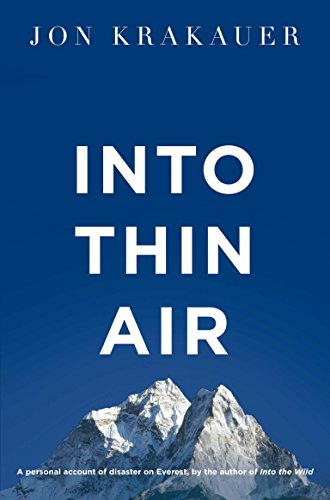
A bank of clouds was assembling on the not-so-distant horizon, but journalist-mountaineer Jon Krakauer, standing on the summit of Mt. Everest, saw nothing that “suggested that a murderous storm was bearing down.” He was wrong. The storm, which claimed five lives and left countless more – including Krakauer’s – in guilt-ridden disarray, would also provide the impetus for Into Thin Air, Krakauer’s epic account of the May 1996 disaster.
By writing Into Thin Air, Krakauer may have hoped to exorcise some of his own demons and lay to rest some of the painful questions that still surround the event. He takes great pains to provide a balanced picture of the people and events he witnessed and gives due credit to the tireless and dedicated Sherpas. He also avoids blasting easy targets such as Sandy Pittman, the wealthy socialite who brought an espresso maker along on the expedition. Krakauer’s highly personal inquiry into the catastrophe provides a great deal of insight into what went wrong. But for Krakauer himself, further interviews and investigations only lead him to the conclusion that his perceived failures were directly responsible for a fellow climber’s death. Clearly, Krakauer remains haunted by the disaster, and although he relates a number of incidents in which he acted selflessly and even heroically, he seems unable to view those instances objectively. In the end, despite his evenhanded and even generous assessment of others’ actions, he reserves a full measure of vitriol for himself.
Into Thin Air Quotes
“The slopes of Everest did not lack for dreamers in the spring of 1996; the credentials of many who’d come to climb the mountain were as thin as mine, or thinner. When it came time for each of us to assess our own abilities and weigh them against the formidable challenges of the world’s highest mountain, it sometimes seemed as though half the population at Base Camp was clinically delusional. But perhaps this shouldn’t have come as a surprise. Everest has always been a magnet for kooks, publicity seekers, hopeless romantics, and others with a shaky hold on reality.”
“Above the comforts of Base Camp, the expedition in fact became an almost Calvinistic undertaking. The ratio of misery to pleasure was greater by an order of magnitude than any other mountain I’d been on; I quickly came to understand that climbing Everest was primarily about enduring pain. And in subjecting ourselves to week after week of toil, tedium, and suffering, it struck me that most of us were probably seeking, above all else, something like a state of grace.”
“Unfortunately, the sort of individual who is programmed to ignore personal distress and keep pushing for the top is frequently programmed to disregard signs of grave and imminent danger as well. This forms the nub of a dilemma that every Everest climber eventually comes up against: in order to succeed you must be exceedingly driven, but if you’re too driven you’re likely to die.”